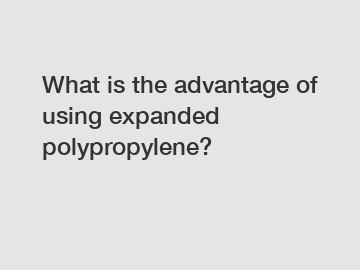What is the advantage of using expanded polypropylene?
What is the advantage of using expanded polypropylene? Expanded polypropylene (EPP) offers several advantages, making it a popular choice in various industries. Its uniqueness lies in its structure, which consists of several interconnected small beads of polypropylene. This article will delve into the origin and evidence supporting the advantages of EPP, as well as its significance and impact.
EPP's advantages stem from its unique structure. The interconnected beads allow for excellent energy absorption, making EPP an ideal material for impact protection applications. When subjected to force, the beads compress and deform, effectively dissipating the impact energy. This property makes EPP commonly used in automotive parts, protective packaging, and sporting equipment, among other applications.
Furthermore, EPP is lightweight and has a high strength-to-weight ratio. Due to its cellular structure, EPP exhibits exceptional stiffness and strength while maintaining a low mass. This lightweight characteristic makes it more fuel-efficient in automotive applications and cost-effective in transportation and shipping industries. Its high strength-to-weight ratio is also valuable in industries where weight reduction is crucial, such as aerospace.

The thermal insulation properties of EPP are another advantage. Its closed-cell structure prevents the propagation of heat, making it an excellent insulating material. This makes EPP suitable for applications requiring temperature control, such as in the automotive industry for insulating engine compartments or in the construction industry for thermal insulation in buildings. Its insulation properties also contribute to energy efficiency by reducing heat transfer.
Moreover, EPP is resistant to chemicals and moisture. This resistance makes it suitable for applications where exposure to harsh environments or chemicals is expected. EPP is extensively used in the packaging industry, particularly for items that require protection against moisture, chemicals, or even static discharge.
The advantages of using EPP have significant implications across various industries. In the automotive sector, the energy absorption capabilities of EPP improve passenger safety, contributing to reduced injury risks during accidents. The lightweight nature of EPP also aids in enhancing fuel efficiency, resulting in reduced carbon emissions. Furthermore, its thermal insulation properties contribute to improved energy efficiency and reduced heating or cooling costs in buildings.
The packaging industry benefits from EPP's resistance to moisture and chemicals, ensuring the protection and integrity of sensitive products during transportation and storage. EPP's lightweight and cost-effective properties also contribute to reducing shipping costs and environmental impact.
In conclusion, expanded polypropylene (EPP) offers a host of advantages due to its unique structure and properties. Its excellent energy absorption, lightweight and high strength-to-weight ratio, thermal insulation, and chemical resistance make it a versatile material used in various industries. The significance and impact of EPP lie in its contribution to safety, fuel efficiency, energy efficiency, and cost-effectiveness across multiple sectors.
If you want to learn more, please visit our website Water-cooled sand shaker, Integrated lost foam casting system, eps pre-expander machine.
132
0
0


Comments
All Comments (0)